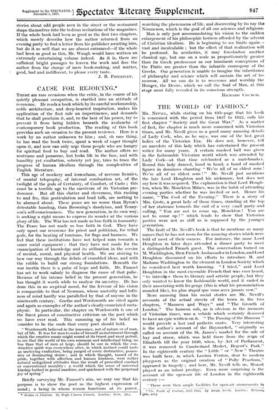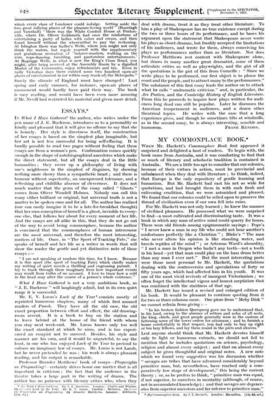THE WORLD OF FASHION.*
Ma. NEVILL, while stating on his title-page that his book is concerned with the period from 1837 to 1922, calls his
first chapter " Society and the Great War." As a matter of fact, the chapter is much more concerned with Victorian times, and Mr. Nevill gives us a good many amusing deta of Lady Cork, who, as he says, was one of the last great ladies of the Victorian Era. He does not, however, tell an anecdote of this lady which has entertained the present writer for many years. A certain masked ball was given in the fashionable Victorian world which was attended hy Lady Cork—at that time celebrated as a matchmaker.
Round this lady danced, hand in hand, a band of masked figures in dominoes chanting " We're all of us eldest sons I We're all of us eldest sons ! " Mr. Nevill just mentions the late Lord Houghton and his nickname, but does not say how it was acquired. The explanation is that Lord Hough- ton, when Mr. Monckton Milnes, was in the habit of attending evening parties whether lie was invited or not. Hence his name, " The Cool of the Evening." There is a story of Mrs. Grote, a great lady of those times, standing at the top of her staircase towards the end of a very small party and calling, " You are not to come up, Monckton You are not to come up ! " which tends to show that Victorian parties were not as stiff as is supposed by the younger generation.
The fault of Mr. Nevill's book is that he mentions so many names that he has not room for the amasing stories which were told of most of their owners. For instance, the same Lord Houghton in later days attended a dinner party to meet a distinguished French guest. The conversation turned on M. Waddington, then French Ambassador in London, and Lord Houghton discoursed on his efforts to introduce M. and Madame Waddington to the element in London Society which he considered best worth knowing. " I tried," said Lord Houghton in the most execrable French that was ever heard, " to introduce them to literary and artistic people, but they only wanted to know the fashionable world, and it ended in their associating with les gengs (this is what his pronunciation sounded like), les plus stupid que vous avez jamais vew."
More amusing than his social stories are Mr. Nevill's accounts of the actual streets of the town in the two chapters, " Manners rind Ways " and " The Growth of London." The hansom cab, as is obvious in the memoirs of Victorian times, was a vehicle which certainly deserved to have an epic written on it. " The Passing of the Hansom " would provide a last and pathetic canto. Very interesting is the author's account of the Haymarket, " originally so called on account of the St. James's market for the sale of hay and straw, which was held there from the reign of Elizabeth till the year 1830, when, by Act of Parliament, it was removed to Cumberland Market, Regent's Park." In the eighteenth century the " Little " or " New " Theatre was built here, in which Lavinia Fenton, dear to modern playgoers as the original creation of " Polly Peuchum," appeared in tragedy ; and here, Mr. Nevill tells us, Mozart played as an infant prodigy. Even more surprising is the account of the open-air life of London in the eighteenth century :—
" There were then ample facilities for open-air amusements in • The World of Fashion, 1837-1922. 13y Unlyla Z will. Loudon ; Methuen, which every class of Londoner could indulge. Setting aside the -two great rallying places of the pleasure-loving world " (Ranelagh and Vauxhall) " there was the White Conduit House at Penton- ville, where Dr. Oliver Goldsmith had once the misfortune of a party of ladies with cakes and cream, and then found himself without the wherewithal to pay the reckoning. At Islington there was Sadler's Wells, where you might not only drink the waters, but regale yourself with the supplementary and gratuitous recreation of ' balance-masters, walking on the . wire, rope-dancing, tumbling, and pantomime entertainments.' At Bagnigge Wells, in what is now the King's Cross Road, you might, after being received at the Assembly Room by a dignified Master of the Ceremonies, enjoy refreshments and tea. Even in early Victorian days there existed some two hundred open-air places of entertainment in (or within easy reach of) the Metropolis."
Surely the climate of England must have changed l Last spring and early summer, for instance, open-air places of amusement would hardly have paid their way. The book is easy reading, and would have been even more amusing if Mr. Nevill had restricted his material and given more detail.



























































 Previous page
Previous page